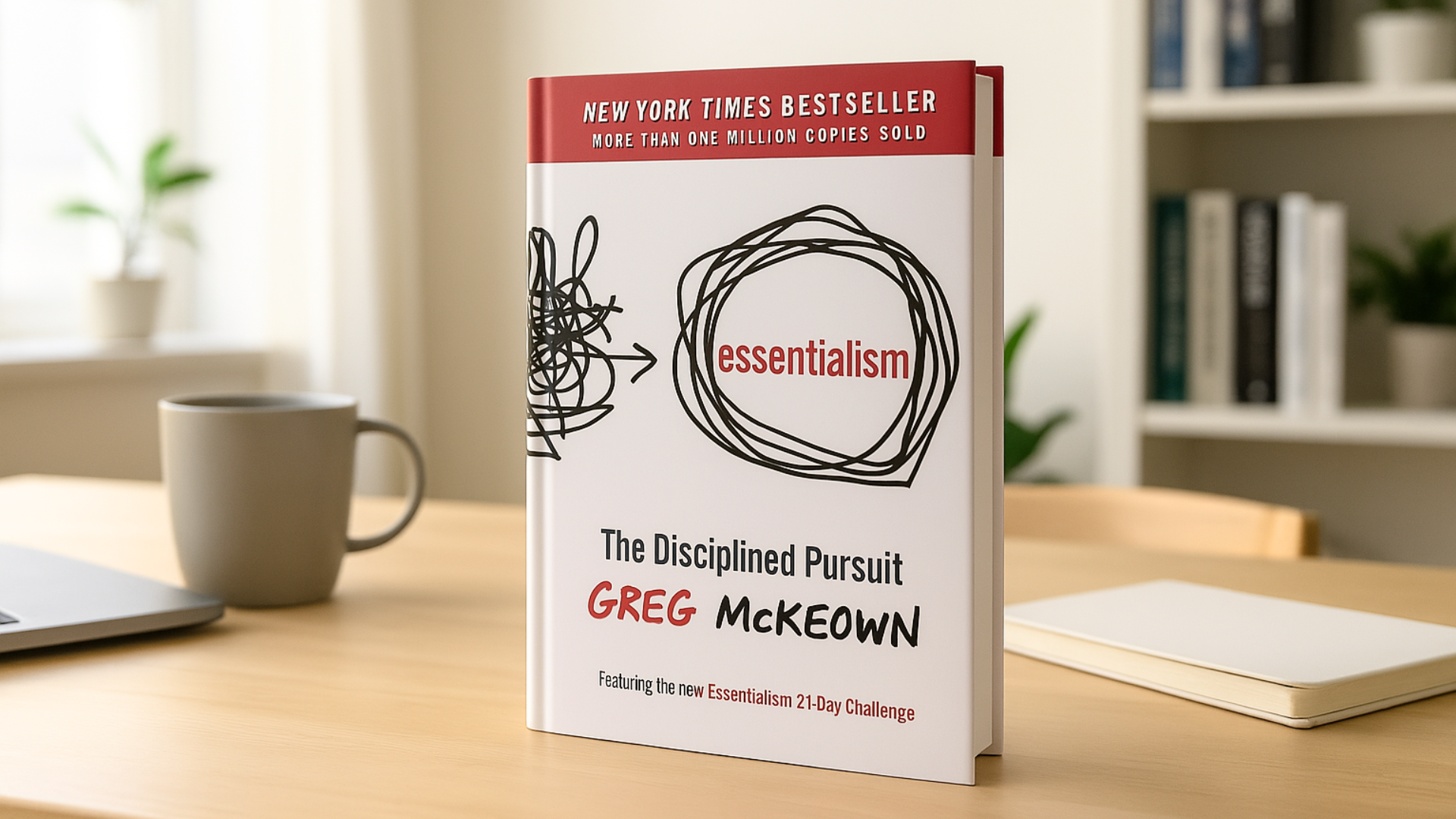Simplify Your Life: How Essentialism Can Help You Stop Overcommitting

Book Review: Essentialism by Greg McKeown
An invitation to do less, more intentionally
In a culture that glorifies busyness and overcommitment, Essentialism offers a pause. Greg McKeown’s central question is clear and urgent: What if we stopped trying to do it all and focused only on what really matters? The result is a book that is both clarifying and countercultural. With calm precision, McKeown outlines a disciplined path toward living and working with greater intention.
This is not a typical productivity guide. It is not about cramming more into your day or managing your time better. Instead, it is a philosophy of living by design rather than by default. McKeown makes the case that success, fulfilment, and meaningful contribution come from eliminating the trivial many in favour of the vital few. At its core, Essentialism is a call to protect your time, energy, and attention like the precious resources they are.
What the book promises
McKeown promises readers more than improved efficiency. He offers a framework for leading a life that feels purposeful, not just productive. The essentialist mindset begins with choice: acknowledging that we do not have to do everything and that saying no is not selfish but strategic. From this foundation, McKeown builds a system that helps readers filter out noise, make better decisions, and invest in what truly matters.
The subtitle says it all: The Disciplined Pursuit of Less. This book promises not just less clutter or fewer meetings, but more clarity, more impact, and more satisfaction with how we spend our days.
What the book delivers
The book is structured into four parts: Essence, Explore, Eliminate, and Execute. Each section supports the essentialist mindset in a practical way.
In the first section, McKeown introduces the core ideas: we always have a choice, most things are not important, and trade-offs are real. This section helps reframe deeply held assumptions that drive overcommitment.
In “Explore,” readers are encouraged to create space to reflect and discern what is truly essential. This includes counterintuitive practices like playing, sleeping, and protecting time to think. McKeown argues that these practices are not indulgent but foundational to clarity.
“Eliminate” is the heart of the essentialist method. McKeown shares tools for saying no gracefully, uncommitting from past obligations, and setting boundaries. These chapters are especially helpful for people who find themselves stretched thin by saying yes out of guilt, fear, or habit.
Finally, “Execute” explores how to make the essential things easier to do. Rather than relying on willpower alone, McKeown recommends systems, routines, and buffers that remove friction. Small wins and consistent habits create flow and sustainable focus.
Throughout, the writing is clear, conversational, and grounded in relatable stories. McKeown draws from research, business case studies, and personal experiences, but the tone remains accessible. This is not a book that speaks down to the reader. It is more like a colleague offering hard-earned insight over coffee.
Style and structure
The structure of Essentialism supports its message. Each chapter is short and to the point, often ending with a single, memorable idea. The layout makes it easy to dip in and out, or to reread sections as needed.
The tone is firm but encouraging. McKeown does not shame readers for being busy or distracted. Instead, he points to a different way, one that prioritizes quality over quantity. His writing is direct, but not cold. He leaves room for reflection without veering into abstraction.
There are no gimmicks here. No complicated systems, acronyms, or charts. Just a steady invitation to focus, simplify, and decide.
Where the book shines
One of the strongest elements of Essentialism is its honesty about trade-offs. McKeown does not pretend that we can have it all or do it all. Instead, he reminds readers that not choosing is also a choice, and often, not a good one. By making the cost of distraction and overcommitment visible, he helps readers feel both permission and motivation to change.
His tools for saying no are particularly useful. Whether it is rehearsing polite refusals, learning to uncommit from past decisions, or setting boundaries that protect deep work, McKeown offers language and strategies that feel realistic in professional and personal contexts.
The book also does a great job of making essentialism feel accessible. This is not a philosophy reserved for minimalists or CEOs. It applies to parents, freelancers, caregivers, students, and anyone who feels spread too thin. The principles are flexible enough to adapt across life stages and roles.
Light limitations
Essentialism is strongest when it is philosophical and reflective. Some readers might wish for more depth in the “how” sections, especially around prioritizing when everything feels important. While the book gives examples of saying no, it leaves some of the emotional difficulty of boundary-setting lightly touched.
Readers looking for a comprehensive system or deep behavioural change strategies may need to pair this with other tools. That said, its strength lies in its clarity, not complexity.
Final thoughts
Greg McKeown’s Essentialism is a refreshing reminder that we are allowed to focus. In fact, we are better for it. The book offers a calm and thoughtful path toward doing less, but doing it better. It speaks especially well to readers who feel pulled in a hundred directions, yet long to feel more grounded and deliberate.
This is a book to keep nearby, revisit in seasons of transition, or use as a check-in when your calendar starts to overflow. Its message is simple but enduring: your time and energy are finite. What you do with them is up to you.
For anyone ready to move from stretched thin to focused and free, Essentialism is an excellent place to begin.
Highly recommended for high-achieving professionals, caregivers, and creatives who feel stretched too thin and are ready to focus their time and energy on what truly matters.